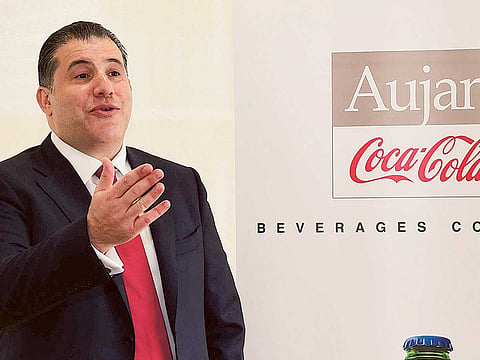Aujan Coca-Cola bets on youth as region lays in turmoil
The company plans to double revenue to $1.5 billion by 2020

Dubai: Saudi Arabia’s Aujan Coca-Cola Beverages Company, one of the Middle East’s largest drink makers, is betting on the region’s youth to double revenue to $1.5 billion (Dh5.5 billion) by 2020.
Tolga Sezer, who took over as chief executive last September, believes the Middle East’s growing youth population is a “significant opportunity.”
The majority of the Middle East and North Africa population is under the age of 30, while more than 100 million, or over 30 per cent, are aged between 15 and 29, according to the Brookings Institute.
“All our brands are targeted to the youngsters and … we should … stay positive because youngsters are growing,” he said in an interview at Aujan Coca-Cola offices in Dubai on Sunday.
He said there has been a rise in discretionary income among the youth in the Middle East, whose spending habits are less conservative than other generations, especially during a downturn.
Aujan Coca-Cola, the Aujan Industries and Coca-Cola Company joint venture that makes and distributes Rani and Barbican beverages in the Middle East, is also betting on an increase in youth spending to help offset rising costs.
Operational costs in the region have increased after many governments cut energy subsidies last year as oil revenues dwindled.
Meanwhile, sales in non-core markets such as Egypt, Iraq and Libya have suffered as a result of weakening economies, the strengthen dollar and conflict in the region.
But its core Arab Gulf market has so far been unaffected despite the falling oil price softening consumer confidence, Sezer said. The company now plans to “accelerate” growth in the Gulf in light of a softer outlook elsewhere.
“[Our products] represents a small happiness [for consumers]. It’s very important for us, that’s why we’re hopeful. It’s difficult but … with the consumer we don’t see a fundamental issue,” he said.
Downsizing
To manage increasing operating costs, the strengthening dollar and weaker demand in non-core markets, Aujan Coca-Cola started trimming its head office count last September when Sezer became the chief executive.
Most of those who have gone under the “mean and lean” strategy have come from top management, resulting in “quite a significant saving,” Sezer said. He declined to state how many people had lost their jobs.
“There is quite an ambitious operating income increase target,” he said.
Sezer said with the head office trim to be completed by the middle of 2016, he expects double-digit revenue growth this year following the 2015’s single-digit growth. He declined to give company figures but said annual revenue is around $750 million.
New taxes
Over the next two years, Aujan-Coca Cola will have to manage the introduction of new consumer taxes in the Arab Gulf States that will make its products more expensive.
Saudi Arabia plans to introduce a 50 per cent tax on soft drinks and a 100 per cent tax on energy drinks next year. The other Gulf States are expected to follow, according to reports. Meanwhile, Value Added Tax (VAT) at a rate of 5 per cent will be introduced to the region, starting with the UAE on January 1, 2018.
Sezer said that the majority of its products will escape the Saudi-led tax while he believes enough time has been given to prepare for the introduction of VAT. “I think it’s quite well planned,” he said.
But Sezer is more cautious about the World Health Organisations call last month for governments to place taxes on sugar sweetened beverages to combat obesity.
Sezer warned against soft drinks being “victimised” and said that the lifestyles in the region need to be looked at, which he said, shows that people are much less active today.
Around 37 million people in the Middle East and North Africa, or 9.7 per cent of the population, are living with diabetes with the number expected to double in the next 20 years, according to the International Diabetes Federation (IDF).
Efforts by the food and beverage industry to offer consumers choices, portion control, improving product labelling and reducing the amount of sugar in products can help, Sezer said.
Lebanon:
In 2014, Aujan Coca-Cola took a 80 per cent stake in Lebanon’s National Beverages Company, that locally produces Coca-Cola and Pampa drinks. A “back to basics” strategy focusing on single serving sales and product branding will see sales in its Lebanese joint venture break even this year, Sezer said. But it has been difficult to build the Coca-Cola brand in Lebanon, where the hangover of the Arab League boycott of the company’s beverages from 1968 to 1991 is still lasting.
“It’s not easy to even make a break even situation in Lebanon,” Sezer said.
Sign up for the Daily Briefing
Get the latest news and updates straight to your inbox


